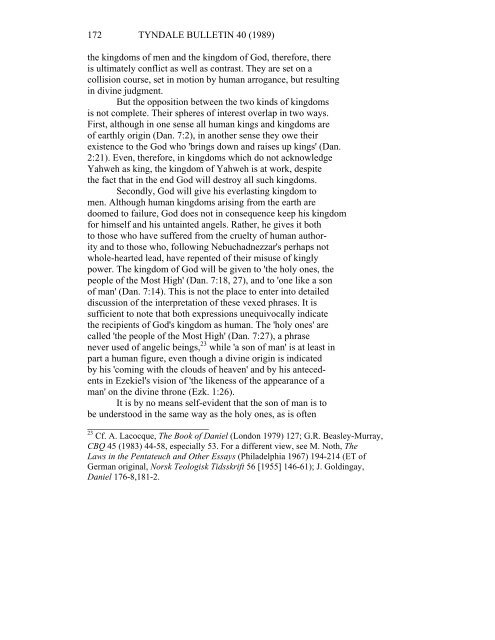THE KINGDOM OF GOD IN THE OLD TESTAMENT - Tyndale House
THE KINGDOM OF GOD IN THE OLD TESTAMENT - Tyndale House
THE KINGDOM OF GOD IN THE OLD TESTAMENT - Tyndale House
You also want an ePaper? Increase the reach of your titles
YUMPU automatically turns print PDFs into web optimized ePapers that Google loves.
172 TYNDALE BULLET<strong>IN</strong> 40 (1989)<br />
the kingdoms of men and the kingdom of God, therefore, there<br />
is ultimately conflict as well as contrast. They are set on a<br />
collision course, set in motion by human arrogance, but resulting<br />
in divine judgment.<br />
But the opposition between the two kinds of kingdoms<br />
is not complete. Their spheres of interest overlap in two ways.<br />
First, although in one sense all human kings and kingdoms are<br />
of earthly origin (Dan. 7:2), in another sense they owe their<br />
existence to the God who 'brings down and raises up kings' (Dan.<br />
2:21). Even, therefore, in kingdoms which do not acknowledge<br />
Yahweh as king, the kingdom of Yahweh is at work, despite<br />
the fact that in the end God will destroy all such kingdoms.<br />
Secondly, God will give his everlasting kingdom to<br />
men. Although human kingdoms arising from the earth are<br />
doomed to failure, God does not in consequence keep his kingdom<br />
for himself and his untainted angels. Rather, he gives it both<br />
to those who have suffered from the cruelty of human author-<br />
ity and to those who, following Nebuchadnezzar's perhaps not<br />
whole-hearted lead, have repented of their misuse of kingly<br />
power. The kingdom of God will be given to 'the holy ones, the<br />
people of the Most High' (Dan. 7:18, 27), and to 'one like a son<br />
of man' (Dan. 7:14). This is not the place to enter into detailed<br />
discussion of the interpretation of these vexed phrases. It is<br />
sufficient to note that both expressions unequivocally indicate<br />
the recipients of God's kingdom as human. The 'holy ones' are<br />
called 'the people of the Most High' (Dan. 7:27), a phrase<br />
never used of angelic beings, 23 while 'a son of man' is at least in<br />
part a human figure, even though a divine origin is indicated<br />
by his 'coming with the clouds of heaven' and by his anteced-<br />
ents in Ezekiel's vision of 'the likeness of the appearance of a<br />
man' on the divine throne (Ezk. 1:26).<br />
It is by no means self-evident that the son of man is to<br />
be understood in the same way as the holy ones, as is often<br />
_________________________<br />
23 Cf. A. Lacocque, The Book of Daniel (London 1979) 127; G.R. Beasley-Murray,<br />
CBQ 45 (1983) 44-58, especially 53. For a different view, see M. Noth, The<br />
Laws in the Pentateuch and Other Essays (Philadelphia 1967) 194-214 (ET of<br />
German original, Norsk Teologisk Tidsskrift 56 [1955] 146-61); J. Goldingay,<br />
Daniel 176-8,181-2.

















